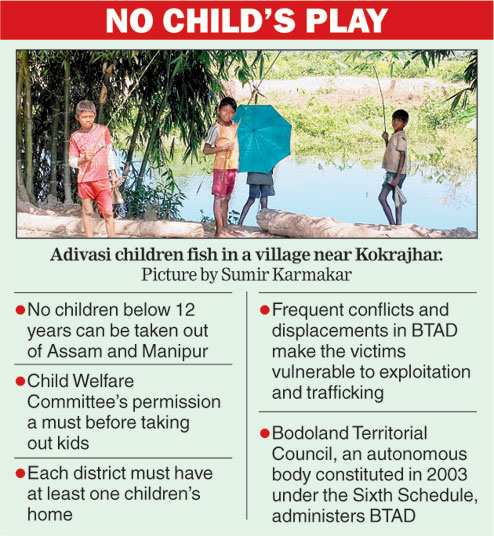Kokrajhar, Oct. 31: Basit Murmu (name changed) was happy and relieved when his 10-year-old son was sent back home from Kerala, four years after an NGO took him to the southern state for "better education". But the problem started after his son reached home.
"He has almost forgotten Santhali (his mother tongue). He now speaks Malayalam which we don't understand. He does not want to go to our Assamese-medium village school as he has studied in an English-medium school there. I don't have money to send him to an English-medium school," said Murmu, an Adivasi daily wager in a village near Gossaigaon town, who came here in search of a children's home that can take care of his son and his education.

Murmu's search turned futile as the Bodoland Territorial Areas District (BTAD), comprising Kokrajhar, Chirang, Baksa and Udalguri, lacks such a home that can provide free boarding and English-medium education. Kokrajhar has two shelter homes run by NGOs but those are meant for short stays only.
"We are coming across many such instances now. Since the Centre recently instructed the state governments to implement the Supreme Court's order (2010) barring children below 12 years from being taken out of Assam and Manipur, many NGOs, which had taken them with the promise of care and better education, are bringing them back. Most of them have forgotten their mother tongue and now they don't want to study here as they followed a different curriculum there," chairperson of Kokrajhar district child welfare committee (CWC) Moloya Deka told The Telegraph.
"Many kids were taken away for better educational prospects when they were as young as three or four years. Neither the NGOs nor the parents informed us when they were taken. But now that they (parents) are facing problems, they are coming to us for help. Situation has not improved yet as we have come across more than 150 children who were taken this year from Kokrajhar district alone," Deka said.
"Recently, the child welfare committee in Patiala (Punjab) sent us a letter to bring back 11 boys (below 12 years) who were taken there from villages in our district in 2010. We contacted their parents but they were unwilling to take them back as they can't afford their education. We can't even send them to the state home for children in Guwahati because of its limited capacity," Deka said. Most parents say they cannot afford to bring up their children and appeal to the committee to send them to homes.
Taking children from Kokrajhar and its neighbouring districts had started soon after the 1996 Bodo-Santhal ethnic clashes in which hundreds of Adivasis were killed, houses set on fire and lakhs of people displaced. Thousands lived in relief camps for years while many settled in huts near NH 31C (connecting Kokrajhar with Bengal). Women victims of violence fell prey to traffickers and prostitution rackets while many children were taken to Kerala, Gujarat, Delhi and other places by religious (charitable) organisations and NGOs.
The issue drew the Supreme Court's attention in 2010 after more than 56 children from Assam and Manipur were rescued from unregistered children's homes in Karnataka and Tamil Nadu. The apex court then barred children below 12 years from being taken out of the two states. The trend, however, continued as similar violence occurred in 1998, 2012 and 2014, leading to deaths and largescale displacement.
According to Assam government officials here, nearly 1,000 children from the BTAD have been "trafficked" since 1996. The issue was discussed during a consultation on adolescents and child rights in the BTAD, here on October 25 and 26. It was organised by the Northeast Society for the Promotion of Youth and Masses, a Guwahati-based NGO with the support of Unicef, Assam.
Director of the NGO, Chiranjeeb Kakoty, said according to the Juvenile Justice (Care and Protection) Act, it was the responsibility of the state government to look after these children in need of care and protection as their parents are unable to do so.
Khashbub Alam Ahmed of Eco System Preservation Trust, an NGO based in Chapar in Dhubri district, said two daughters of a Muslim daily wager, now aged 10 to 12, were recently sent back from Delhi by an NGO who had taken them after the 2012 riot. "The children want to go back to Delhi again as they can't adjust here," he said.










